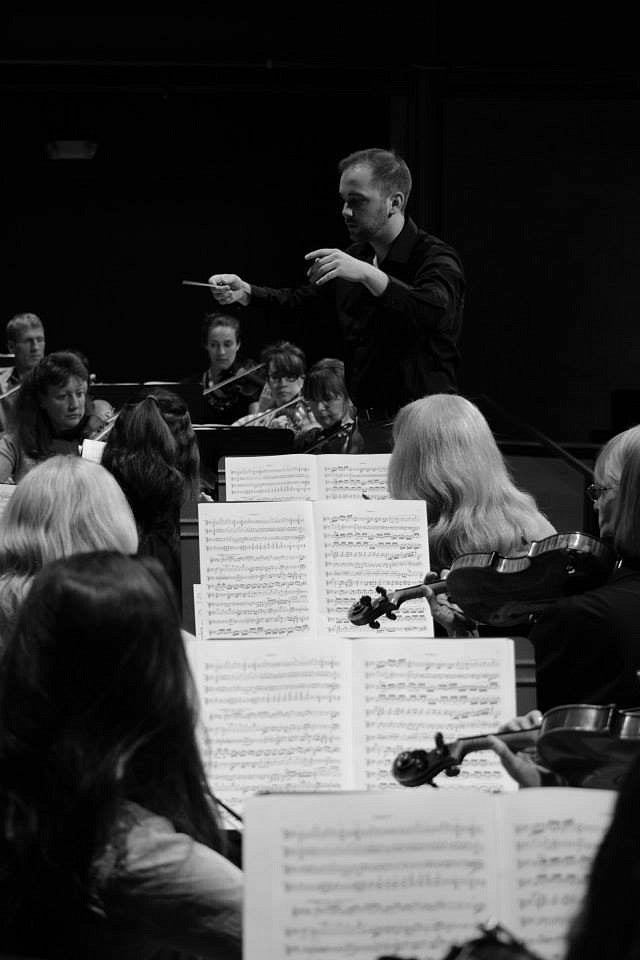July 14, 2015—Zeke Fetrow, a 2015 graduate of the UO’s master’s degree program in conducting, summarizes his work in music in a single word: flexible.
While studying at the UO, Fetrow worked with numerous arts groups—including the University Symphony Orchestra, UO Opera Ensemble, Oregon Composers Forum, Campus Orchestra, Repertoire Singers, University Singers, UO Chamber Choir, and Oregon Camerata—in varying capacities. Fetrow’s role with the various ensembles varied from music director, to conductor or assistant conductor, to performer.
As if all that was not enough, Fetrow also served as the assistant conductor of the Eugene Opera, Oregon Mozart Players, and Oregon Music Festival, as well as performing in the Oregon Bach Festival for the last two years. He has served as assistant conductor at Central Presbyterian Church and music director at Ebbert Memorial United Methodist Church.
“To be a part of so many fantastic programs in Eugene was a tremendous privilege,” Fetrow explains, “and it gave me the diversity of experience necessary to be prepared to work as a professional musician.”
Sharing the Experience of Sound
Performances are such precious moments, especially in academia. Musicians spend weeks, perhaps months, perfecting every note, rhythm, and articulation in a piece, oftentimes to give a single performance of a work. There’s a lot of pressure. Fetrow says that when he walks out on stage, he strives to be the translator for the audience, lifting the music off the page and sharing the composer’s message.
“It isn’t about ink and paper, it’s about the shared experience of the sound and that experience varies from piece to piece,” Fetrow says.
“When I conduct Beethoven, I want the audience to feel the anguish of struggle and the joy of triumph,” Fetrow continues. “When I conduct Tchaikovsky, I want listeners to feel the weight of the darkness that haunted him and the euphoria of escaping it. When I conduct Mahler, I want the people to feel the gravity of love and the sorrow of heartbreak. I walk on to the stage in the hopes that I can help the performers give the audience that experience, and that the audience is ready for the journey.”
Fetrow says that studying music has shaped his life by giving him a tremendous amount of perspective.
“Music is a microcosm of the human experience; there are great joys and triumphs but there are also heartbreaks and failures,” Fetrow says. “Art is a unifying and connecting force in a world that’s grows more distant and impersonal every day. Music brings me perspective on the things that are important: love, friendship, and laughter.”
The World Stage
In the spring of 2013, the University of Oregon Chamber Choir—including Fetrow, a baritone—was honored with an invitation to compete in the Cork International Choral Festival in Dublin, Ireland. The festival is extremely competitive and only the top performing choirs in the world are invited. Fetrow says that the Chamber Choir performed fantastically, and under the direction of Dr. Sharon Paul, took first prize, winning the Fleischmann Trophy.
In spring 2015, Fetrow enjoyed the opportunity to travel with the Chamber Choir to Marktoberdorf, Germany to compete in another international festival, where the choir took second prize as well as an additional special honor for their performance of Hugo Wolf's Ergebung, a compulsory piece performed by all the choirs.
“Traveling abroad has facilitated some of the most rewarding and most meaningful experiences I’ve had at UO,” says Fetrow. “Being able to travel overseas requires the support of the faculty, staff, and administration. I am fortunate to have attended a university that takes pride in advocating for its students.”
“This is why you do this.”
Fetrow explains that he was always astonished at how appreciative, attentive, and moved the choral audiences were, and that it gave him renewed vitality to improve his craft. Music can serve so many purposes, and Fetrow was left with one very vivid moment of their most recent tour.
The Chamber Choir toured with "Good Night, Dear Heart," a piece that composer Dan Forrest wrote for the funeral of his 24-year-old daughter.
“We were in Landshut, Germany performing in the Salzstadel, an old salt storage facility that has been remodeled into a concert venue.”

“I don’t know what the piece meant for him, but I knew that he needed us," Fetrow reflects. “As we walked off stage that evening, I remembered thinking to myself, ‘This is why you came here. This is why you do this.’ There’s a lot of power in music, and with that power comes tremendous responsibility to serve the world, one performance at a time.”
Under the guidance of Maestro David Jacobs, Fetrow has had the opportunity to conduct the University Symphony Orchestra on a great variety of repertoire. He most recently conducted the Brahms Serenade No. 2, Borodin’s Polovetsian Dances, and Rimsky-Korsakov’s Scheherazade.
“The orchestra has grown immensely under the direction of Dr. Jacobs, both in enrollment and skill, while the quality of students coming into the orchestra program continues to be outstanding every year,” explains Fetrow.
Fetrow attributes the University of Oregon as an imperative part of his success, particularly lauding professors Jacobs and Paul for their mentorship.
“At the UO, I was afforded so many opportunities to learn to become a better musician, says Fetrow. “I have found my purpose in the world while studying music and I will take this knowledge forth on my journey as a conductor, teacher, and artistic leader in my community.”
Fetrow has been accepted into the DMA program in orchestral conducting at the Johns Hopkins University—Peabody Conservatory, but he is currently exploring options.
“I think the successful conductor is someone who always sees themselves as a work in progress,” Fetrow asserts. “The successful conductor humbles themselves before a room full of intelligent musicians, someone who trusts their performers, values their input, and encourages them to be better.”
--Victoria Schmidt
